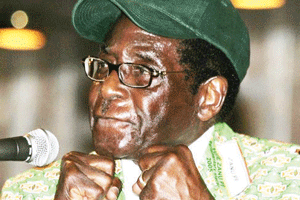
THE presidential election is now just 10 days away, and barring any unforeseeable mishaps, Zimbabweans will soon know who is going to occupy the State House for the next five years.
REPORT BY PATRICE MAKOVA
The Zimbabwe Electoral Commission (Zec) has promised it will announce the result of the presidential election within five days, after the poll.
The top contenders in the watershed polls are President Robert Mugabe of Zanu PF whose 33-year rule is under threat from Prime Minister Morgan Tsvangirai of MDC-T.
The smaller formation of the MDC led by Professor Welshman Ncube is however warning of an upset.
Analysts say if Mugabe wins, no radical transformation is expected, while a victory by Tsvangirai may change the course of the nation forever.
Political analyst, Gift Mambipiri said a Zanu PF win would likely set the country on an edge for the next six or more months until the party settles its succession matrix.
He said in the meantime, the destiny of the country would be tied to the fate of the party’s leadership dynamics.
- Chamisa under fire over US$120K donation
- Mavhunga puts DeMbare into Chibuku quarterfinals
- Pension funds bet on Cabora Bassa oilfields
- Councils defy govt fire tender directive
Keep Reading
“The succession debate has proved to be a hot potato over the years. It is now a time bomb. The formula used to solve this succession equation, and the result, will determine whether we proceed to Canaan [freedom], or regress to Egypt [bondage],” said Mambipiri. But, he said, the odds were heavily stacked against a clean succession formula.
Mambipiri sees the succession flames being stoked from deep within the party even after a Zanu PF win, warning “those flames will consume every other part of our national fabric.”
Two factions in Zanu PF are battling to succeed 89-year-old Mugabe. One is loyal to vice-President Joice Mujuru and the other has links to Defence minister Emmerson Mnangagwa.
Both Mujuru and Mnangagwa have however repeatedly denied leading factions or harbouring presidential ambitions. Mambipiri said if the MDC-T wins, Tsvangirai would be lucky to assume power.
He said if he does, nothing material would change in the development discourse of the country in the first years, because Zanu PF has in the last 33 years spread its wings into every other aspect of people’s lives.
“To ‘de-Zanunise’ the state structures to facilitate a new governance language will be a mammoth task, yet the country desperately needs to chart a new course,” said Mambipiri.
University of Zimbabwe political science lecturer, Shakespear Hamauswa said a win by either of the two main candidates was tricky.
However, he said Tsvangirai had better potential as he has been learning from Zanu PF’s mistakes. Hamauswa said with Tsvangirai’s “commitment” to curb corruption and promote good governance, a new and transformed Zimbabwe was possible.
“He has been in government under the shadow of Zanu PF, thus given the chance to rule alone the systems of governance will be transformed for the better,” he said.
Hamauswa said the MDC-T was unlikely to issue “reckless” statements that would invite the security chiefs to the electoral process like what they did in 2008.
He said if the MDC-T was prepared to give a safe exit package to the Zanu PF hardliners and security chiefs, stability would be guaranteed.
“Thus they have to be strong enough to tell the world that an eye for an eye will not be possible in Zimbabwe. A gradual reform will make MDC’s rule and governance easier,” said the political scientist.
He said the international community was unlikely to endorse Mugabe’s victory, especially considering the chaotic special voting process.
Hamauswa said Zanu PF was likely to further frighten potential investors, not only foreign, but also domestic ones.
He said no one would invest in a country where polices were not predictable.
“In terms of bringing the much needed change to the country, Zanu PF is promising nothing, this is clear from their campaign message on television that is full of hate and derogatory statements,” said Hamauswa.
“Besides deriding Tsvangirai, we are not aware as to what the Zanu PF government will have for media reforms, for home-seekers or for civil servants.”
He said Zanu PF also threatened to bring back the Zimbabwean dollar and to pull out of Sadc, a move that would further alienate the country from the community of nations.
“So a country with friends from the East only will not be able to survive economically, it will be like putting all eggs into one basket,” said Hamauswa.
The Zanu PF manifesto focuses on indigenisation and economic empowerment, promising to create 2,2 million jobs over the next five years by unlocking value from idle assets worth at least US$1,8 trillion of mineral claims or reserves.
The MDC-T manifesto on the other hand, promises to create one million jobs by 2018 and a US$100 billion economy by 2014.
It focuses on investment entrepreneurship, job creation, rural development and poverty alleviation.
zanu pf win will not change much — analyst
Commenting on the possible outcomes of the elections, political analyst Tamuka Chirimambowa said a Mugabe win would see the continuation of the current indigenisation and economic empowerment polices which were benefitting only the elite and those closely connected to Zanu PF.
He said on the other hand, if Tsvangirai won, his government was likely to opt for a broad-based empowerment programme as espoused in the MDC-T’s Agenda for Real Transformation (ART) and Jobs, Upliftment, Investment, Capital and Environment (Juice) economic plan.
Chirimambowa said the MDC-T was talking of both investment and creation of jobs as not everyone has the capacity to start a company.
“It’s a fallacy to say that everyone can own a company. You need to strike a balance between creating jobs and investment,” he said.











